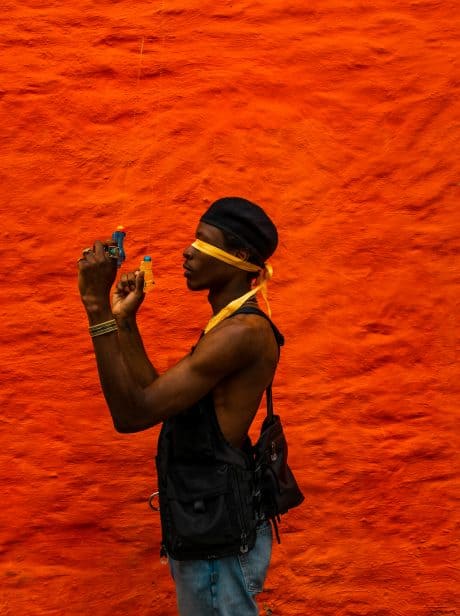KÜNSTLERHAUS
BETHANIEN
Exhibition
another Exhibition
The Missile Factory
another Exhibition
BLINDSPOT
When all else fails, try Love
Nicole Rafiki

untitled, 2019, © Nicole Rafiki, Courtesy Nicole Rafiki
Nicole Rafiki’s interdisciplinary artworks move between photography and bead work, textiles and text, and the use of memorial objects old and new. Rather than producing finished products as an end result, Rafiki (b. 1989) treats art making as a practice of remembrance, healing and cultural analysis.
Her images often employ artistic strategies that avert a western anthropological gaze. Incorporating symbolisms, fables, and tools of visual storytelling and oral history, she invokes themes of forced migration and war ghosts, racialized perceptions of Blackness and femininity, and fraught colonial traditions of spatial power and temporal erasure. As a child of the Kongolese diaspora with connections in various countries in Africa and Europe, she taps into precolonial forms of global interconnectedness and knowledge transfer. Using instruments of oral history, Rafiki embodies ways of storytelling that account for how things are felt and perceived rather than spoken of in the biased languages of hegemonic history writing.
The exhibition “When All Else Fails, Try Love“ is a result of Rafiki’s residency in Berlin that she spent sitting with Germany’s colonial history and its aftermath. Working with the notion of „looted history“, she turns to the problem of stolen cultural elements and the colonial entanglements of art history.
Continuing her work on connected global histories and intergenerational forms of remembrance and healing, she also turns to the presence of human remains in German museum collections, hospital archives and universities, which stem from the colonial practice of collecting human bodies under the auspices of research. Here, Rafiki traces how dehumanizing logics continue to operate in cultural institutions today when the bones of ancestors become labeled as „artifacts“ or „property“.
Experiencing institutional practices of this kind as a sensation of being relegated to the „living dead“, Rafiki responds by embalming herself. How does a Black body exist when it is conditioned to act from a position of “other”? In her site-specific installation, spanning photographic, video and sculptural work, we witness the artist’s enactment of mummification as a first step to resurrection. Refusing the role of Black bodies to become the designated agents of change vis-à-vis „looted histories“, Rafiki hands the responsibility for restitution back to the institutions in question.
Staying with life and acknowledging living souls as a practice of healing is also enacted in Rafiki’s mural collage. Inspired by the vocal public messaging on the building facades in Kreuzberg 36 that form part of the neighborhoods’ political architecture, Rafiki chooses the city’s collective walls of remembrance to pay homage to the millions of peers who fought, died or were displaced in what is recognized as the most recent world war – the wars waged in the Congo from 1997- 2003. Spanning several decades, photographs of late and living family members, many taken in the midst of war time in the DRC, assemble on her spatial collage. The artist’s loved ones are shown dressed for outings and weddings, or taking a family photo right before being forced to flee from their home. Where an outside gaze renders reality through violent epistemes of „crisis“ and „conflict“, „refugee“ and „artifact“, stepping into loving care emerges here as a practice of everyday resistance to dehumanization.
– Noemi Y. Molitor
Nicole Rafiki is a grantee of Office for Contemporary Art Norway (OCA).
Exhibition
30.09. – 23.10.2022
Tue - Sun: 2 - 7pm
Admission free
Opening
29.09.2022
7pm
ARTIST
Nicole Rafiki




